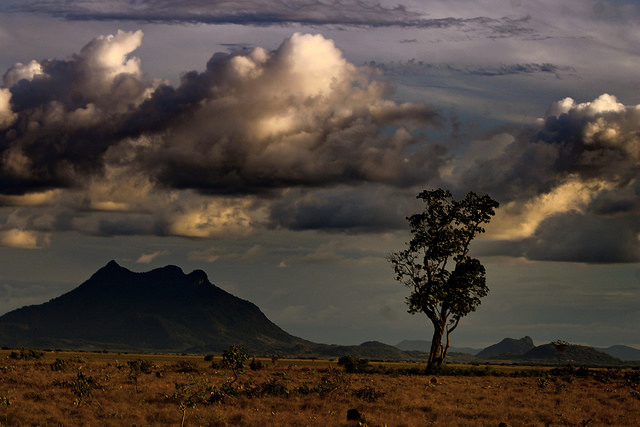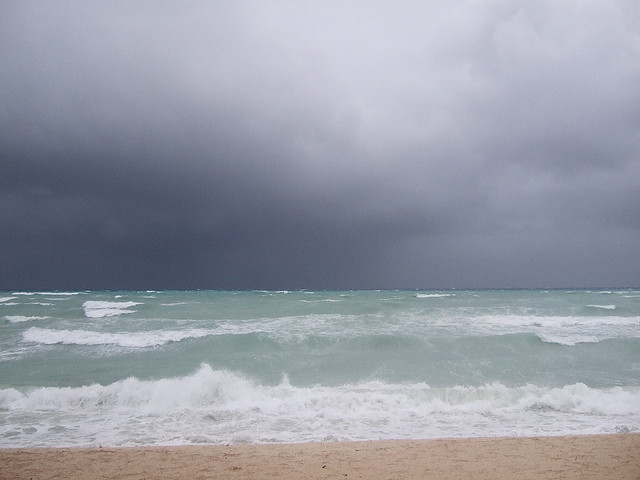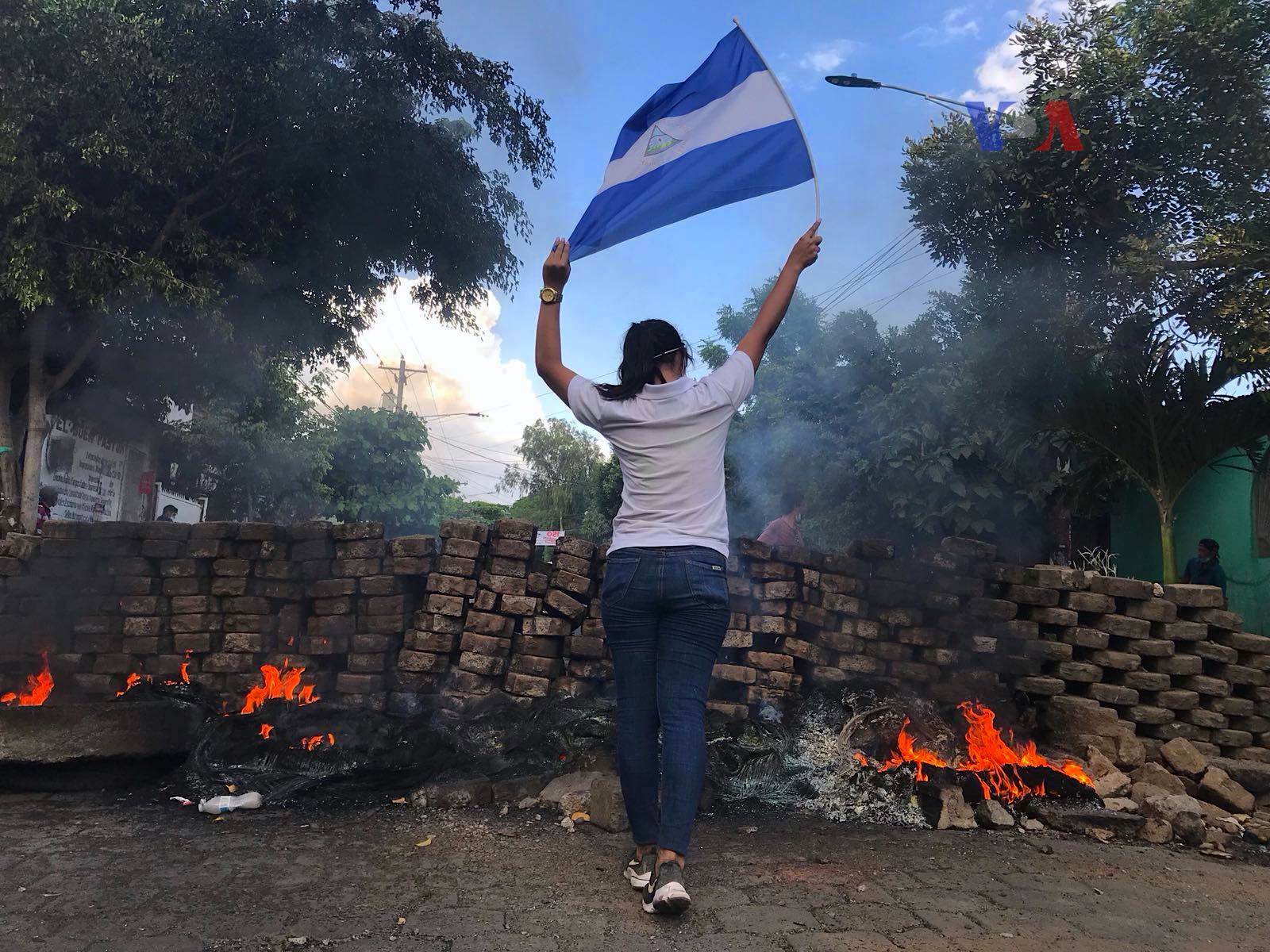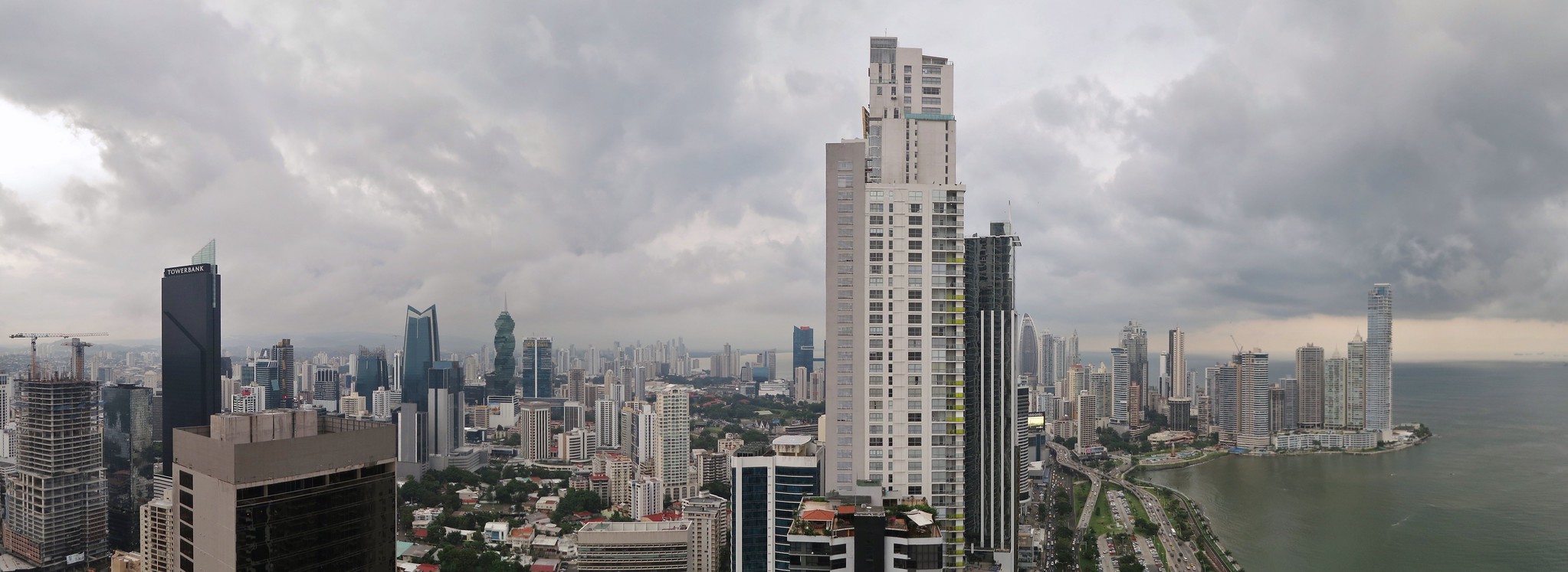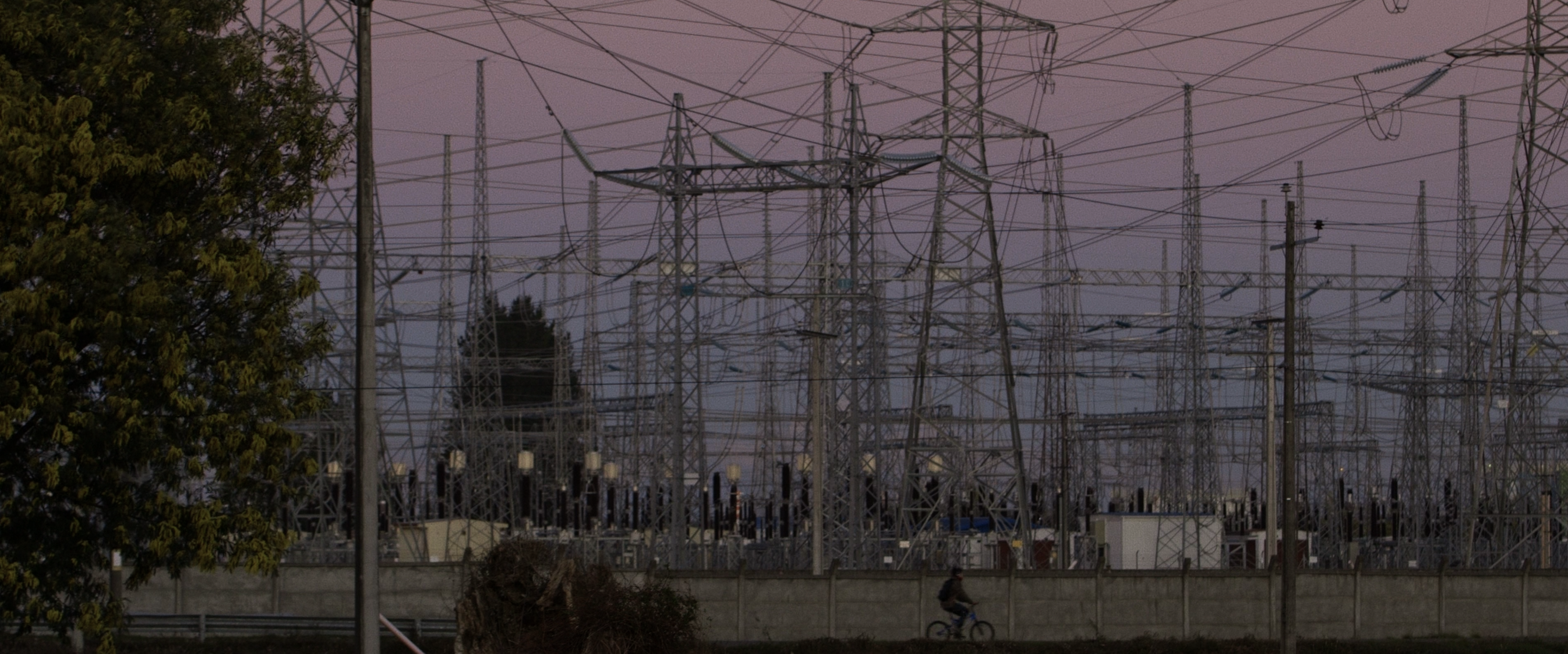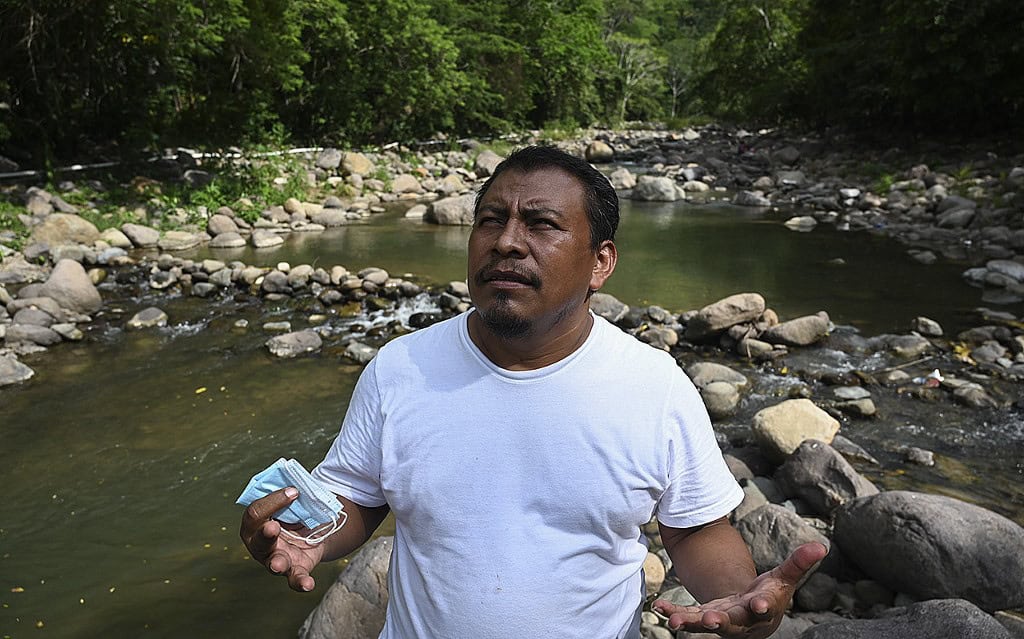
Central America, Features, Honduras
Honduran Environmental Activist Juan Lopéz Murdered for Fighting Mining and Drug Trafficking
November 18, 2024 By Daniel Fonseca
A murmur of prayers fill the room where Father Melo leads the funeral of Juan López, 46, the latest environmental defender to be murdered in Honduras. Melo hangs his head and speaks at a slow but steady pace. Today his expression is a tired one.
The priest raises his hands and begins the ceremony, “Save us, Lord, from all evils.” The audience of approximately two hundred friends and fellow activists respond individually. Someone shouts out, “From injustices!” The priest continues on, “Save us, Lord.”
Soon after, more and more voices start calling out, listing their grievances against murders, corrupt politicians and violence. Right before the service is about to come to a close, someone in the crowd yells out, “From the narcos,” and the priest, who still has his hands raised to the sky, gazes out over the faces of the community, responding “Save us, Lord!” one final time. The silence that follows these last words is heavy, as dense as the history that marks this land.
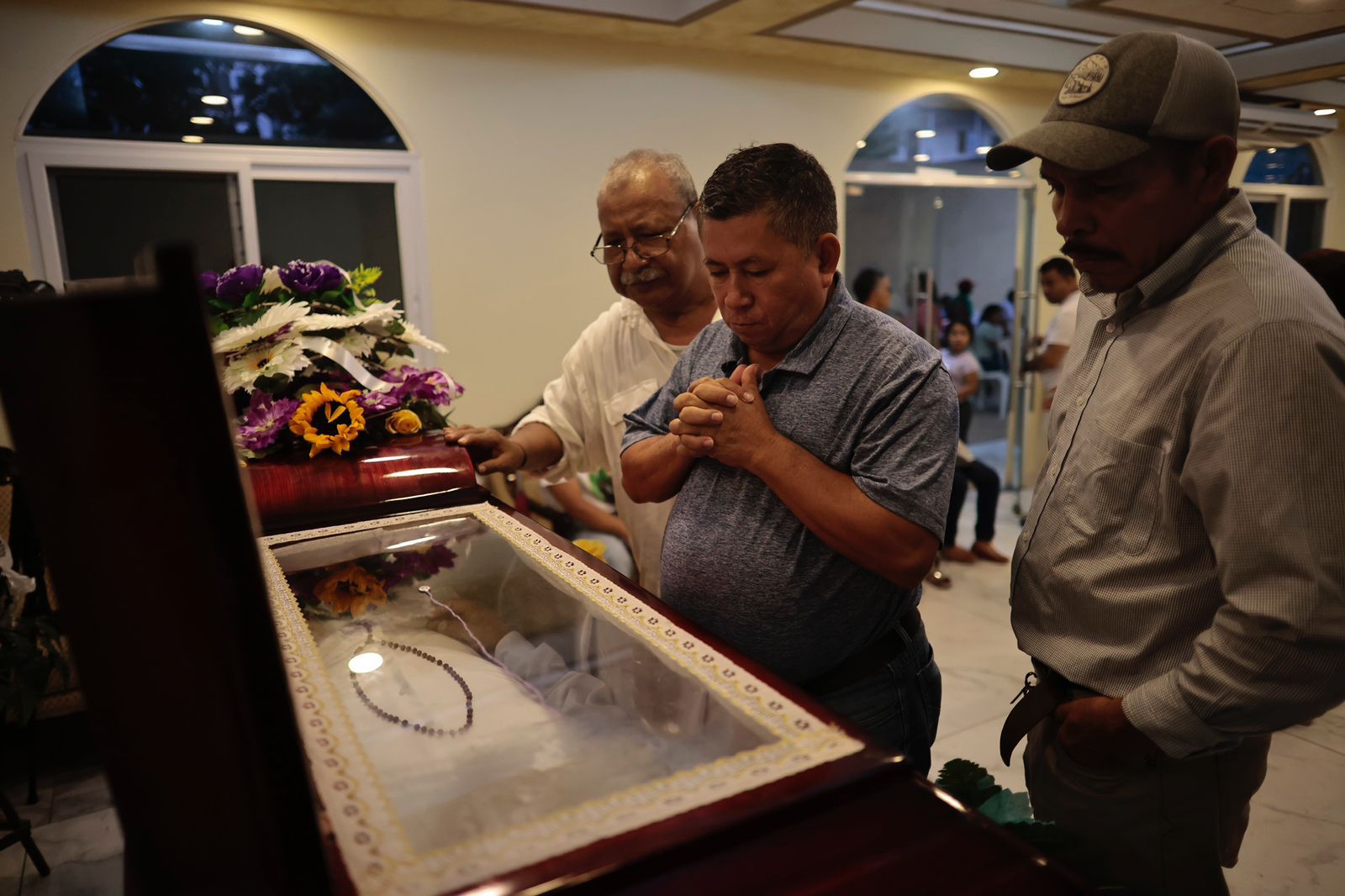
Father Melo (far left) with two mourners at the Amor Eterno funeral home in Tocoa, Colón looking down over the casket of Juan López // Photos by Jorge Cabrera
In Support of Water and Life
Juan López was murdered on September 14 in Tocoa, a city located in Bajo Aguán, a region in northern Honduras known for its high rate of violence and strong presence of drug traffickers. Juan was leaving a church with his wife and daughters when a hitman intercepted his vehicle and fatally fired at the activist. It was the eve of Central American Independence Day.
The same day of his death, Juan had published a statement openly condemning extractive industries in Honduras including mining and agriculture businesses that have negatively impacted the country over the course of two centuries. He also spoke out against the presence of drug trafficking in the area.
“I apologize in advance if my words, which come from the soul, make anyone uncomfortable, but in honor of the truth, I must say them,” he wrote.
“I apologize in advance if my words, which come from the soul, make anyone uncomfortable, but in honor of the truth, I must say them.”
The killing of Juan López is the latest chapter in the story of Bajo Aguán. This agricultural sector has been the center of environmental and social conflict over the past three decades which has claimed the lives of hundreds of farmers and environmental activists.
López, who had become more involved in campesino organizations in Aguán, dedicated the last years of his life to fighting against Inversiones Los Pinares (“Los Pinares”), a mining company that is part of Grupo EMCO, a conglomerate with investments in energy, construction, mining, and airports which has ties to the Honduran military and foreign investors.
Since 2014, activists have attested that Los Pinares’ iron oxide extraction operations in the Carlos Escaleras National Park have been destroying the Guapinol and San Pedro rivers by reducing water levels and leading to the contamination of water once used for washing, cooking, and bathing. Environmental advocates claim that entire communities were displaced because the water they needed to survive was no longer safe to drink.
As part of their fight for environmental justice, Juan and fellow members of the Tocoa Public Goods Committee faced threats, harassment and defamation on social media which ultimately turned into violence and state-sanctioned criminalization. Other environmentalists in the region have faced similar challenges.
In 2019, members of the Guapinol community protested by setting up the “For Water and Life” encampment. For 88 days they blocked access to the core zone of the Carlos Escaleras National Park where the mine was located until the encampment was violently dismantled by state police.
Shortly after, a judicial persecution led by the Public Ministry accused protestors of being part of an aggressive ploy that set fire to several containers owned by Los Pinares and a security guard’s vehicle. This accusation initiated a legal process against Juan López and 30 of his fellow activists. Eight of Juan’s associates spent nearly three years in prison.
It is difficult to determine if the events in the accusation occurred or not. However, community representatives have denounced the malicious actions of the prosecutor’s office, accusing it of colluding with EMCO. Amnesty International declared the eight imprisoned environmental human rights defenders to be “prisoners of conscience,” asserting there was no legitimate evidence to justify the criminal charges and that they were prosecuted solely for exercising their human rights.
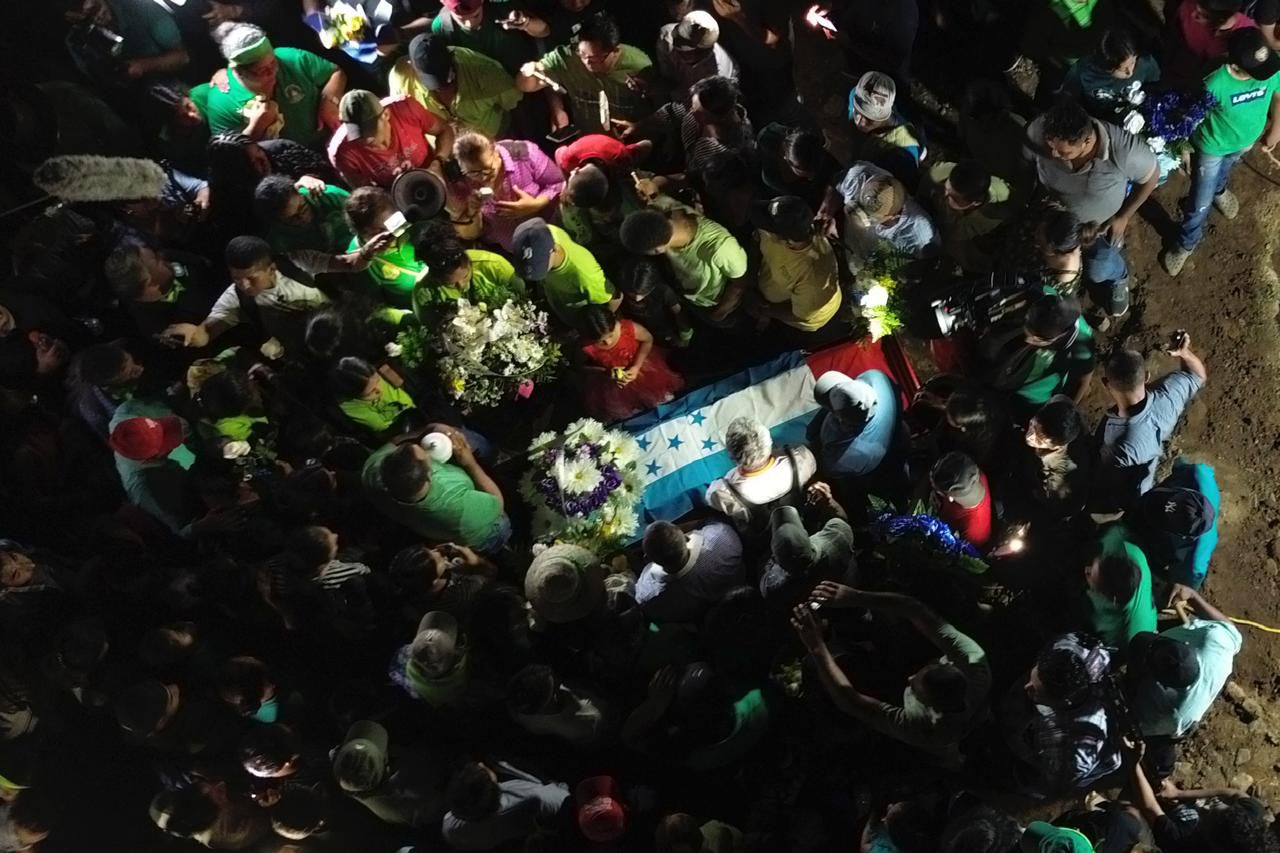
Crowds of mourners surround the casket of Juan López at Cementerio Nuevo in Tocoa, Colón // Photo by Jorge Cabrera
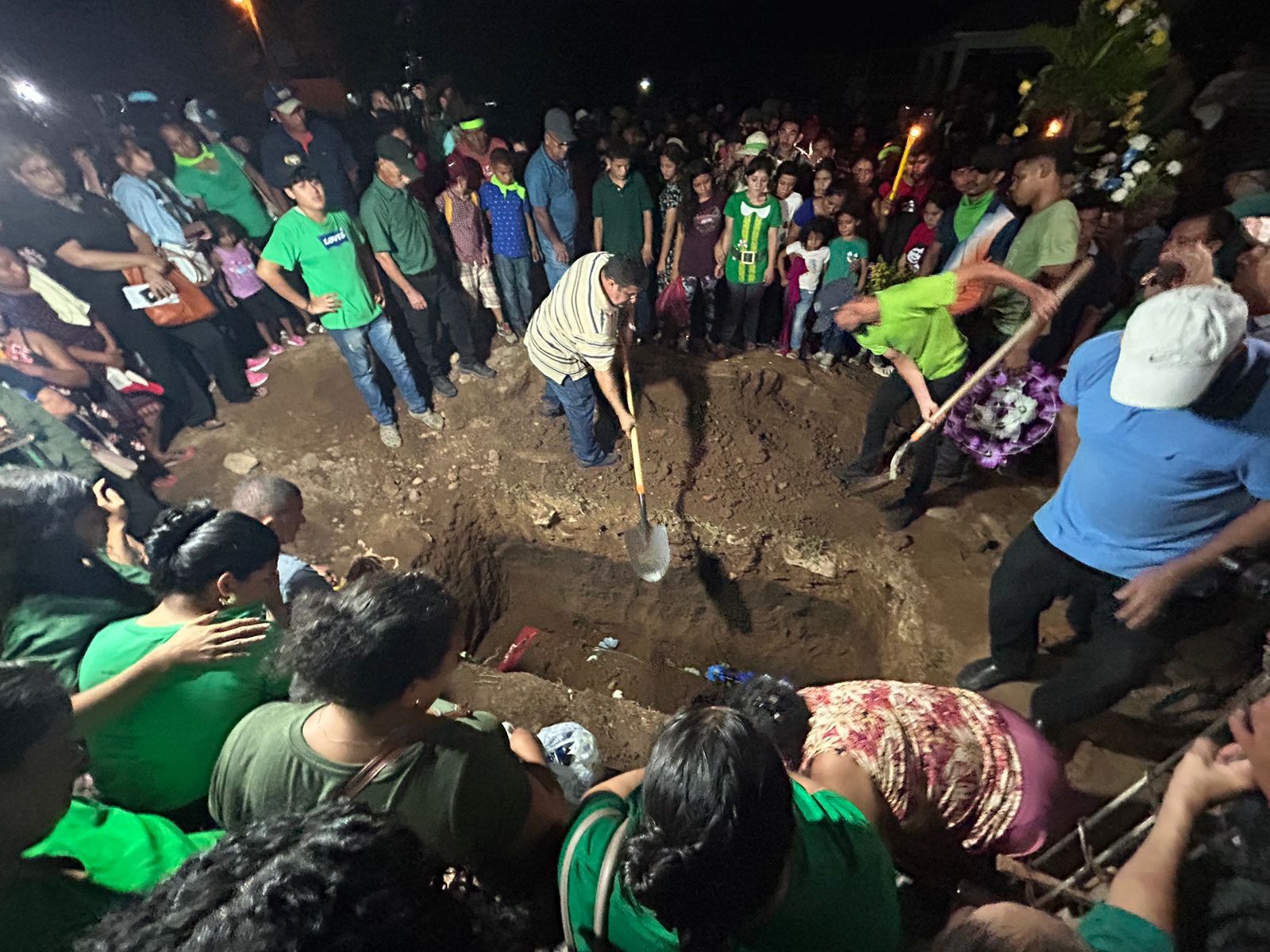
As two mourners shovel dirt, many attendees are dressed in green to show their support for the environmental justice movement // Photo by Jorge Cabrera
The Power of EMCO and Lenir Pérez: An Empire Built on State Complicity
The President of Grupo EMCO is Lenir Pérez, a Honduran businessman who became increasingly influential during the administrations of former Honduran President Juan Orlando Hernández between 2014 and 2022. The country’s former president is currently serving a sentence for drug trafficking in the United States. Pérez—who has also donated to the campaign of Salvadoran President Nayib Bukele—has been directly accused by environmental defenders in Aguán for his involvement in the violence, persecution, and criminalization that they have faced in recent years.
A Global Witness report titled “Honduras: The World’s Most Dangerous Country for Environmental Activism,” published in 2017, collected testimonies from affected community members who claimed Pérez offered bribes to gain the communities’ support. When people refused to accept the money, they were met with threats.
“[Both Lenir Pérez’s] company and public officials have been operating with total impunity and they have not been stopped,” says Leonel George, a councilman in Tocoa and Juan’s former colleague. He is also one of the defendants charged in the Guapinol case. “The state should have canceled the mining concessions and contracts a long time ago and not continue to drag its feet, but they continued promoting [Lenir’s projects]. This worsened the threat situation,” he asserts.
In addition to the support Pérez has received from the state, his projects have materialized thanks to his commercial partners, such as the steelmaker Nucor, one of the largest steel producers in the world. An investigation revealed that Nucor and EMCO were partners from 2015 to 2023 which coincides with a period of heightened criminalization and violence against those opposing mining projects.
In April 2023, one of Lenir Pérez’s properties in the United States was raided by the FBI, who questioned him about his connection to the steelmaker, according to Pérez’s lawyer.
Another key ally of EMCO has been the mayor of Tocoa, Adán Fúnez, a member of the ruling Liberty and Refoundation Party. On June 13, 2024 Fúnez irregularly held an open town hall meeting to ensure the installation of a thermoelectric project based on petroleum coke i.e. “petcoke”, a petroleum byproduct known for its harmful health effects and which is not regulated in Honduras. This project is owned by another of EMCO’s companies.
In September 2024, weeks before Juan’s assassination, a 2013 video emerged showing Carlos Zelaya, brother-in-law of President Xiomara Castro, and Adán Fúnez negotiating campaign money with some of Honduras’ most prominent drug lords.
In September 2024, weeks before Juan’s assassination, a 2013 video emerged showing Carlos Zelaya, brother-in-law of President Xiomara Castro, and Adán Fúnez negotiating campaign money with some of Honduras’ most prominent drug lords.
In one of his last public appearances, Juan López, alongside representatives from the Municipal Committee in Defense of the Common and Public Goods of Tocoa, demanded the resignation of the mayor. “It depends on the people’s strength to force him to resign because, under these circumstances, he is no longer the right person to lead the destiny of the municipality,” López said at the conference. Days later, he was assassinated.
The Legacy of Water Rights Activists in Honduras
The data shows that Juan’s death is not an isolated case. In 2023, Honduras became the third most dangerous country in the world for environmental defenders after Colombia and Brazil. According to a Global Witness report, 18 environmental human rights activists were murdered in Honduras that year.
Among the 18 deaths recorded that year, three were activists from Aguán: Jairo Bonilla, Aly Domínguez, and Oquelí Domínguez. All three had worked with Juan.
This assassination has many parallels with the death of another Honduran human rights advocate who dedicated her life to defending Honduras’ rivers: Berta Cáceres, murdered in 2016. Both faced corporate conglomerates backed by the state in their defense of water rights for the communities who relied on rivers and other natural resources. These cases highlight the violence thousands of activists experience in Latin America and throughout the world.
Cáceres fought against a hydroelectric project owned by the Atala family, one of the wealthiest families in Honduras. This project received funding from the Central American Bank for Economic Development, the Dutch bank FMO, and Deutsche Bank despite allegations of irregularities in the project and documented violence against communities opposing its installation. Following her murder, Berta’s family continues to demand justice that never seems to come.
The killing of Juan López left a deep wound across the Aguán community. In addition to losing one of their most important leaders, community members continue to witness the steep price paid by those choosing to stand up to corporations that seek to divide up control over their lands. His death, coupled with the lack of response from the state, has left a sense of abandonment among those who are still left to resist.
Although the Honduran legal system continues to promise justice, the people of Tocoa aren’t so sure that those responsible for Juan’s assassination will be prosecuted. Weeks after the funeral, they feel unprotected. Jessenia, a community journalist who has supported the fight to defend Aguán’s rivers plainly states “If they dare to go after Juan, what can the rest of us expect?”
About Daniel Fonseca
Daniel Fonseca is a Honduran journalist and columnist. He covers issues related to human rights, migration and the environment. He has coordinated a team of 44 reporters in 16 countries to investigate housing access for women, children and LGTBIQ+ individuals. He was nominated for the 2023 Gabo Award and was a 2024 finalist for the Inter American Press Association's Award for Excellence in Journalism. His work has been published in 11 countries and translated into three languages. He lives in Tegucigalpa, where he reports and writes.
Daniel Fonseca es periodista y cronista hondureño. Cubre derechos humanos, migración, medioambiente y violencia. Coordinó a un equipo de 44 periodistas en 16 países para investigar el acceso a la vivienda para mujeres, jóvenes y personas LGTBIQ+. Fue nominado al Premio Gabo (2023) y finalista del Certamen a la Excelencia Periodística de la Sociedad Interamericana de Prensa (2024). Su trabajo se ha publicado en 11 países y traducido a tres idiomas. Vive en Tegucigalpa, donde reportea y escribe
